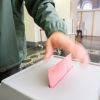Ballot papers checked three times
Elections in Germany: who counts the ballot papers? An election worker tells us about her work.


On 23 February 2025 Elvira Schwintzer will be one of 650,000 election workers who ensure that Germany’s early Bundestag election goes off without a hitch and that every vote is counted properly.
Frau Schwintzer, what made you become an election worker?
I retired five years ago and wanted to give something back to the city where I live and where I used to run the central library. I am very active as a volunteer such as in the Protestant church, at a church bookshop and as a reading assistant in the primary school. I have always been very interested in politics, too. It’s absolutely vital that everyone votes, because if you don’t, you can’t complain later. My husband and I first got involved during the 2021 municipal elections in our federal state of Hesse. We were trained in exactly what we have to do and what we are not allowed to tell anyone. We were told who was allowed to vote and who is not. Since then we have been involved with all the elections: municipal, state parliament, European elections, and now our second general election. We also have a mayoral election on the same day.
What is your job on election day?
At every polling station there are several election workers with a range of tasks. One checks the polling card and proof of identity, after which the voter is recorded on the register and we ask if they have any questions. In the poll both most voters don’t spend long thinking about it: they have obviously usually decided in advance who they want to vote for. After that, somebody else checks that the sealed envelope has been put in the ballot box properly. We are always on duty for half a day, either from 8 am to 1 pm or from 1pm to 6 pm. Once the polls have closed, all 10-12 election workers come back together. The envelopes emptied out onto tables and each of us takes a pack and counts the votes. On each table, each pack gets counted three times in total by different people and once again at the end. The reporting officer then records the numbers. Usually the numbers match straight away, but once we had to re-count five times.
Do you belong to a political party?
I always vote the same way but I am not a party member and I do not have a mandate. In that way I am almost unique, as at least 90% of election workers belong to the various parties. Without them, you would not have enough volunteers. While we do it voluntarily, we now get €35 to reimburse our expenses. We also get free drinks – after all, we do spend more than half a day in the polling station.
What is your favourite moment in the polling station?
As very few people vote by post in Germany, most vote in person, so I always meet lots of people I know from my neighbourhood. You can have a nice chin wag with them! My husband works at another polling station and we always compare the results of “our” electoral districts, each of which has 380 people, with the results for the whole country. That’s always very interesting.


